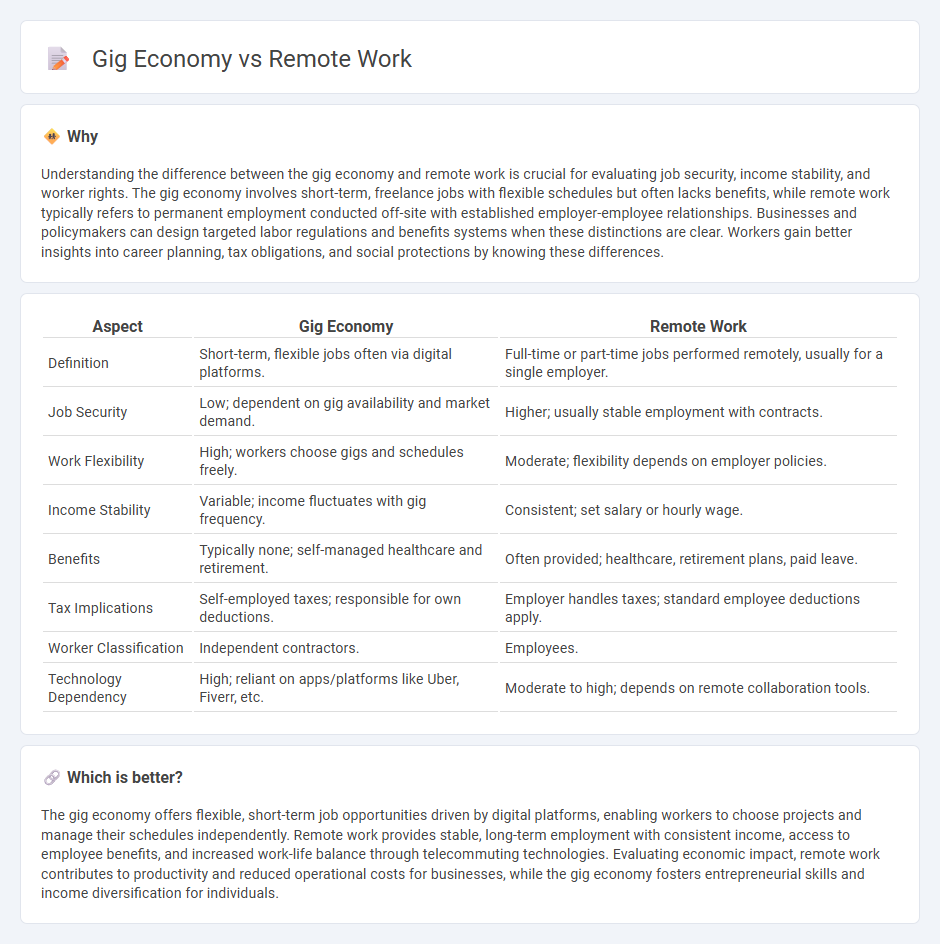
The gig economy thrives on short-term, freelance jobs offering flexibility and independence, while remote work emphasizes long-term employment with consistent roles performed from home or any location. Both models leverage digital platforms but differ in stability, income predictability, and worker benefits. Explore the evolving landscape of modern work arrangements to understand their economic impact.
Why it is important
Understanding the difference between the gig economy and remote work is crucial for evaluating job security, income stability, and worker rights. The gig economy involves short-term, freelance jobs with flexible schedules but often lacks benefits, while remote work typically refers to permanent employment conducted off-site with established employer-employee relationships. Businesses and policymakers can design targeted labor regulations and benefits systems when these distinctions are clear. Workers gain better insights into career planning, tax obligations, and social protections by knowing these differences.
Comparison Table
| Aspect | Gig Economy | Remote Work |
|---|---|---|
| Definition | Short-term, flexible jobs often via digital platforms. | Full-time or part-time jobs performed remotely, usually for a single employer. |
| Job Security | Low; dependent on gig availability and market demand. | Higher; usually stable employment with contracts. |
| Work Flexibility | High; workers choose gigs and schedules freely. | Moderate; flexibility depends on employer policies. |
| Income Stability | Variable; income fluctuates with gig frequency. | Consistent; set salary or hourly wage. |
| Benefits | Typically none; self-managed healthcare and retirement. | Often provided; healthcare, retirement plans, paid leave. |
| Tax Implications | Self-employed taxes; responsible for own deductions. | Employer handles taxes; standard employee deductions apply. |
| Worker Classification | Independent contractors. | Employees. |
| Technology Dependency | High; reliant on apps/platforms like Uber, Fiverr, etc. | Moderate to high; depends on remote collaboration tools. |
Which is better?
The gig economy offers flexible, short-term job opportunities driven by digital platforms, enabling workers to choose projects and manage their schedules independently. Remote work provides stable, long-term employment with consistent income, access to employee benefits, and increased work-life balance through telecommuting technologies. Evaluating economic impact, remote work contributes to productivity and reduced operational costs for businesses, while the gig economy fosters entrepreneurial skills and income diversification for individuals.
Connection
The gig economy and remote work are interconnected through their reliance on digital platforms that facilitate flexible, on-demand labor without traditional office settings. Both models optimize workforce scalability and reduce overhead costs by enabling professionals to join projects globally, transcending geographic constraints. This synergy drives a shift toward a decentralized, technology-driven economic landscape, increasing opportunities for freelance and contract workers worldwide.
Key Terms
Flexibility
Remote work offers unparalleled flexibility by enabling employees to choose their working hours and environments, leading to improved work-life balance and increased productivity. The gig economy provides even greater flexibility through short-term, project-based tasks that allow individuals to select jobs aligning with their skills and schedules without long-term commitments. Explore deeper insights on how flexibility in remote work and the gig economy shapes modern employment trends.
Employment status
Remote work typically involves an employee maintaining a formal employment status with benefits and job security, whereas gig economy workers operate as independent contractors without such guarantees. Employment status in remote work aligns with traditional labor laws and company policies, while gig workers often face ambiguous legal protections and lack consistent income streams. Explore how employment status impacts rights and responsibilities in these evolving work models.
Income stability
Remote work often provides more income stability due to consistent salaries, regular pay schedules, and employer benefits like health insurance and retirement plans. The gig economy, while offering flexibility, typically involves unpredictable earnings, irregular hours, and lack of traditional benefits, increasing financial uncertainty for workers. Explore detailed analyses and strategies to manage income stability in both remote work and gig economy settings.
Source and External Links
What Is Remote Work? Ultimate Guide - Remote work is a professional setting where employees perform their jobs outside the company's physical office, often from home or any location, enabled by digital collaboration tools like Slack and Zoom; it's reshaping work-life balance, communication, and productivity metrics globally.
How to Embrace Remote Work - Successful remote work relies heavily on digital tools for communication and collaboration and intentional efforts to build and maintain company culture through clear rules and regular virtual engagement to foster strong team relationships.
What is the definition of remote work? - Remote work is a flexible arrangement where employees perform their duties at an alternative worksite under a written agreement, without the expectation of regularly working at the official agency office location.
 dowidth.com
dowidth.com